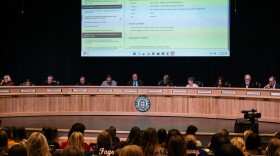Rupert Murdoch's News Corp. and the executive who oversees its British newspapers are under increasing fire as a new and vile twist in the mobile phone hacking scandal has engulfed one of its tabloid newspapers.
This week, the Guardian newspaper alleged that News Corp.'s News of the World — the largest-circulation Sunday newspaper in the United Kingdom — paid an investigator to intercept voice mail messages on the mobile phone of a 13-year-old schoolgirl, Milly Dowler, after her disappearance in 2002.
A man was convicted of killing her in June. But just days after her abduction, as police were scrambling to find Milly, the newspaper's investigator hacked into her phone, according to the Guardian story. Hungry to hear more voice mails that might contain newsworthy information, the investigator erased her messages once her mailbox was full.
That led Dowler's parents to believe she might be deleting her own voice mail messages, and therefore was still alive.
Convinced she was still alive, Milly's parents gave an interview to News of the World.
None of the new allegations has been denied.
The editor at the time was Rebekah Brooks. She's now the top executive at Murdoch's News International, which oversees the tabloid News of the World and the Sun as well as the more prestigious Times of London and the Sunday Times. Now, there are some calls for her resignation. She issued an email to staffers saying it was "inconceivable" she had any knowledge of the events. But some of her journalistic peers and rivals in London say it is hard to give her the benefit of the doubt.
Brooks' signature issue while editor of the News of the World was an anti-pedophile campaign, so the allegation that her paper interfered with the police inquiry into the abduction of a girl cuts at the heart of her record.
The Guardian story led to widespread condemnation throughout journalistic and political circles and inspired the scheduling of an unusual emergency debate in the House of Commons for Wednesday. Ford Motor Co.'s U.K. division announced it would pull all its advertising from News of the World.
British Prime Minister David Cameron took time at a press conference in Kabul earlier today to denounce the allegations in strong terms.
"If they are true, this is a truly dreadful act and a truly dreadful situation," Cameron said.
But in noteworthy remarks, the prime minister also took pains to express the independence of Scotland Yard.
"They should feel they should investigate this without any fear — without any favor — without any worry about where the evidence should lead them," Cameron said. "They should pursue this in the most vigorous way that they can in order to get to truth of what happened."
Police officials have been accused of cutting short an earlier investigation because of cozy ties they had with News of the World and other influential Murdoch papers.
In the U.K., major papers are known for attempting to wield political clout — none more so, nor more effectively, than those owned by Murdoch. The conservative Cameron and the former Labor Prime Minister Tony Blair each won the support or sympathy of Murdoch's papers en route to 10 Downing Street.
In 2009, after paying a million-pound settlement to keep details of a similar hacking incident quiet, the company blamed a few bad apples and condemned the Guardian as a rival playing dirty for its exposes.
It took a series of lawsuits by celebrities and politicians to breathe fresh life into the scandal.
Past victims of hacking by people employed by the News of the World included the movie star Sienna Miller, Princes William and Harry, soccer stars, Cabinet secretaries and members of Parliament. Several MPs told the BBC they were fearful enough of the reach of the newspaper's investigators that they held back from supporting more rigorous investigation of the company's practices.
Two men have been jailed — one a private investigator, another a former editor for the tabloid. One of Brooks' former newsroom deputies resigned as Cameron's communications director for his links to the scandal. In April, after several arrests of former journalists, the News of the World finally apologized for hacking into the mobile voice mail messages of politicians and celebrities, and created a fund to pay.
The private investigator involved, Glenn Mulcaire, issued a statement from prison apologizing for his actions and blaming "relentless pressure" from the paper. According to the Guardian, police determined that the mobile phones of parents of two other murdered girls were also hacked by investigators for the News of the World, and investigators are reviewing other high-profile cases.
A spokeswoman for the parent company, News Corp., did not return a request for comment.
Alan Rusbridger, editor-in-chief of the Guardian, says British tabloids have always been known for their vigor and cheeky wit. But he argues the decline of newspaper circulation has led to an unseemly chase for celebrity scoops.
"There's something ugly that has taken over in the past 10 years, driven by, I think, a feeling that people in public life didn't deserve any privacy at all," Rusbridger said in an interview with NPR.
Rusbridger noted that this hacking episode interfered with an intense police search for a missing girl and gave her parents false hope she was alive.
"This took it into a new level of revulsion," Rusbridger said.
News International's Simon Greenberg — Brooks' chief spokesman — did not reply to NPR's request for comment, but he told the BBC that the Guardian story represented the first that News International had heard of the Milly Dowler hacking story.
"We're absolutely shocked and appalled by what we read about yesterday," Greenberg told the BBC. "We've absolutely got to establish the facts, to get to the bottom of it. And if they are true, the strongest possible actions will be taken."
Copyright 2022 NPR. To see more, visit https://www.npr.org. 9(MDAzMjM2NDYzMDEyMzc1Njk5NjAxNzY3OQ001))







